CS center graduates return to teach
“Remembering how kindly I communicated with me during my studies, I try to create the same impression among those who attend my course.” Graduates of the CS Center, who became teachers, remember the years of study and talk about the start of their teaching path.
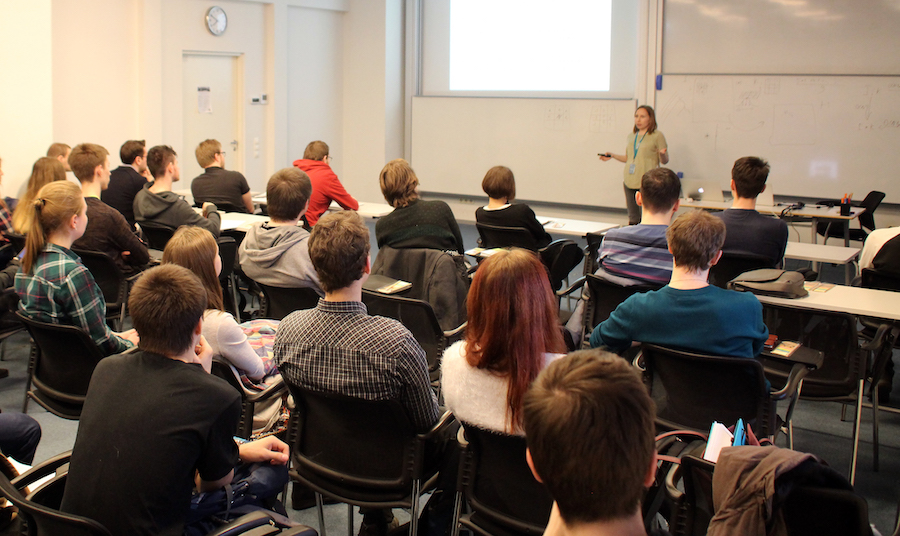
Until April 13, the reception of applications for admission to the CS center is open. Full-time study in St. Petersburg and Novosibirsk. Correspondence for residents of other cities.
Nikolay Polyarny , graduation 2016. He is engaged in the development and implementation of computer vision algorithms in the field of three-dimensional reconstruction - he is developing the Metashape program (previously PhotoScan) in Agisoft. Last fall, I read a course on video card computing at the CS Center.
Mikhail Slabodkin , graduation 2014. An analyst at Yandex, teaches at the magistracy ITMO-JetBrains and at the Computer Science Center. The center conducts practice in discrete mathematics .
Cyril Broadt , Issue 2018. Develops interactive systems in Tinkoff Bank. Conducts seminars on deep learning in Novosibirsk.
Leila Khatbulina , graduation 2017. She works in the laboratory of big data analysis methods at HSE in the JUNO project, teaches data analysis for economists, and develops the FProg project. In the CS center I checked assignments on mathematical statistics .
Alexey Artamonov , issue 2014. Develops a drone in Yandex. Since autumn 2014, he has been reading an annual course in image and video analysis .
Let's start from the beginning. What memories are preserved about entering the center?
Kolya Polar
I always liked interviews very much: in different companies and in the CS center. It seems that at the interview in the center there was something about mathematics, but the emphasis was on the question of motivation. This is almost always the case: at the university, in any research and in any complex work, the results are very much dependent on motivation. If it is not there, then whatever predisposition and skills are, at some point, everything will get tired and there will be no need to go further.
I vaguely remember the story, as I was driving to the first lecture after receipt. I just quit my job that day to immerse myself in my studies, and I was late for a lecture, because the process of dismissal was delayed. As a result, I was driving with an interesting feeling of a kind of transition right next to it, when the completion of one results in being late for the beginning of the other. It is difficult to accurately convey, but amid the general optimistic expectation of something new, it was funny.
Cyril Broadt
I did it twice: in 2015 and 2016. The first time I knew nothing about machine learning and decided to try to do just because I could. Yes, and I had to leave for an internship in France, finish my studies, so I did not qualify and at the second full-time stage I failed, gaining less than half of the passing score for the interview. I was surprised that the tasks in mathematics were of an olympiad level, but I was not particularly upset because I did not know what all this was, and even if I entered, I would not be able to learn.
At the end of 2015, after finishing my studies, I went back to Novosibirsk, because a girl was waiting for me at home. I remember at the beginning of 2016 on the NSU website there was news about an open course on parallel programming from the SAD, which I decided to go to. This course completely took one evening from me for a lecture and a seminar and one full day off for homework per week.
Then the set started, and I decided to try again, although I didn’t really burn with it. If one course takes so much time, then with three I was afraid to even imagine what would happen. This time the second stage was by correspondence. After a while I receive a letter that I scored a little less than a passing score. But I was lucky that I passed an open course on parallel computing - the curators took this into account and invited me to the third stage. It is already clear what happened :)
Leila Khatbulina
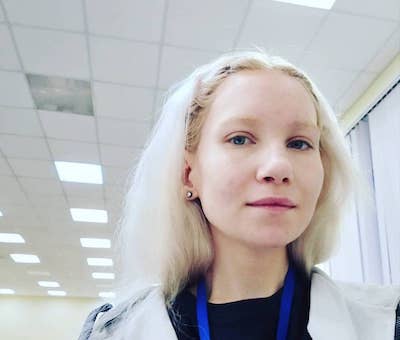 I was seriously preparing for admission: I watched lectures on Stepik, went to Pavel Mavrin in the ITMO programming circle and on Andrei Kolpakov's additional seminars on the mat. analysis in LETI, read Cormen.
I was seriously preparing for admission: I watched lectures on Stepik, went to Pavel Mavrin in the ITMO programming circle and on Andrei Kolpakov's additional seminars on the mat. analysis in LETI, read Cormen.
Before the interview, I didn’t sleep for a day, I was experiencing and in parallel practicing to write algorithms on a piece of paper, and in my head there was always one thought: “The main thing is to take the middle of the array correctly”.
Lyosha Artamonov
The first time I tried to enter the center was still in my second year at university. It was the spring of 2011. By education I am an astrophysicist, and at school I was more engaged in mathematics and physics and less in computer science. I had an idea about programming in different languages, we even wrote games, but there was no algorithmic base. Motivation before the first interview was also at the level: “Well, my friends advertised, they say it's cool there”. As you might guess, the first time I did not enter. Lacked basic knowledge.
From the beginning of 2012, I was motivated to enroll, I began to watch online courses. My math teacher from the school circle went to California and dropped a link to Machine Learning lectures from Professor Jaser S. Abu-Mostafa. My knowledge of English was barely enough to understand what was going on, the formulas helped me the most. I carefully looked through each slide and eventually passed the course perfectly, although I expected to receive no more than a triple. Then, in the summer, there was a Machine Learning course from Andrew Ng on Coursera. Interest in this area helped me a lot.
The second time I came with a little more knowledge and a clear plan of what I want to learn in the center. I was lucky that I was called for an interview: in the end, I had a marginal score. Not to say that I somehow especially prepared for questions on algorithms, so I tried to reduce interviews to machine learning and called gradient descent my favorite algorithm :)
What course most influenced what you are doing now?
Kolya Polar
Anton Kovalev computational geometry course at ITMO. Lectures were interactive, you had to try to invent designs yourself, and not just listen. Posh flight of thought! As a result, I went to Transas to Anton to work on what I am doing now - the reconstruction of three-dimensional surfaces from photographs. This area relies heavily on computational geometry.
From the CS Center I remember the course on functional programming in Haskell. Firstly, because the lectures are also suitable for those who fall asleep if they are told in too great detail and slowly, and for those who do not have time to understand and are lost due to the high rate or lack of a detailed explanation. Secondly, this is an example of an area that is hardly needed directly at work, but consciousness is wandering in the right direction.
Misha Slabodkin
It is difficult to single out one thing; I will mention several areas of my educational and professional activities after graduating from the CS Center:
- All courses in theoretical computer science have significantly influenced the choice of further education, supervisor and the topic of two diplomas (in graduate and specialty). In particular, the excellent teachers of these subjects have always admired and inspired me.
- I began to seriously study the algorithms in the CS center and I teach them with great pleasure and benefit for the third year already in the joint magistracy of ITMO and JetBrains, and earlier at the Academic University.
- In the analytical work in Yandex, I use the knowledge of Python, statistics and algorithms.
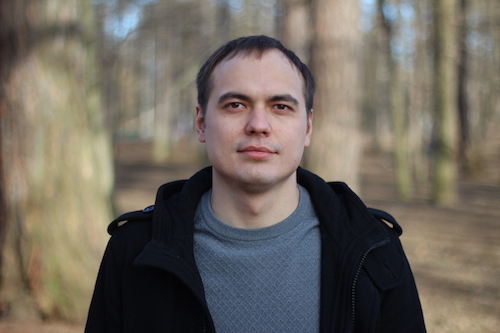 Lyosha Artamonov
Lyosha Artamonov
It was 2012, I was in the first year of the center. My fellow student, Vadim Lebedev, who enrolled a year before me, showed me interesting tasks from the course on image analysis and told me about the tools with which they solve them. I began to watch the course record and then, next year, I took it. The course instead of the semester became annual, I was filled with computer vision even more. For several years, I myself have been teaching this discipline at the CS Center, and at work I am engaged in analyzing the data obtained from the drone's camera.
Do CS center students have free time? How much did you have left? What were the difficulties during training?
Kolya Polar
It's hard to say in hours. In the second and third year of study at the CS center I was in the third and fourth year at ITMO, I worked 35-40 hours in parallel (sometimes less, sometimes more), on Saturdays I took on children’s tasks in a mathematical circle, participated in hackathons and in some moment passed on a driver's license. It seems to me that the time is relatively rubber and usually depends on how much I want to be in time and what the resource is.
Misha Slabodkin
For me, studying at the CS center intersected with two courses of math and one master's course at the Academic University. After couples at the university in Peterhof, it was hard enough to take several classes at the center. But I was able to spend a tricky combination and count some courses many times - in two, and one even in three institutions: first at the same time in the CS center and at mathema, and later reassigned to the AC. Of the other difficulties: it was impossible to study technical subjects without your easily portable computer. Theoretical coursework I have not always turned out well.
Cyril Broadt
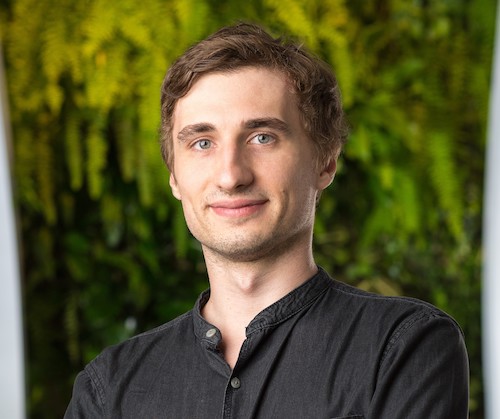 In addition to courses at the center, I worked 24 hours a week and tried to study in graduate school, from which I was then flooded :) After that, I had time to play the piano, go swimming and spit at the ceiling. In general, the time was full. The big difficulty was that many courses in Novosibirsk at that time were by correspondence. It was impossible to ask a question in person if you cannot formulate it properly, since you yourself do not understand exactly what you want to ask. In our year there were few fellow students or no one at all on general courses, and it is much easier for me to learn new things when discussing tasks with someone else — it turns out to be more productive.
In addition to courses at the center, I worked 24 hours a week and tried to study in graduate school, from which I was then flooded :) After that, I had time to play the piano, go swimming and spit at the ceiling. In general, the time was full. The big difficulty was that many courses in Novosibirsk at that time were by correspondence. It was impossible to ask a question in person if you cannot formulate it properly, since you yourself do not understand exactly what you want to ask. In our year there were few fellow students or no one at all on general courses, and it is much easier for me to learn new things when discussing tasks with someone else — it turns out to be more productive.
Leila Khatbulina
I don’t remember that anymore, but I remember that there was always not enough time and I took courses unevenly, so I spent all evenings, weekends and holidays doing my homework.
Lyosha Artamonov
For a while, not to say that there was a mass of him. But I do not remember that I had to sacrifice something significant in order to do everything. I went to the gym, watched TV shows, met with friends. When at the university I only had to write a diploma, I even managed to work at half the rate.
Difficulties were with logistics. Every day I spent on the road more than three hours a day, probably at that time I was resting my head. When classes at the center were added, the time increased to four hours. And the presence of the machine would not solve my problems then. The main thing - I did not have time to eat normally, this should be avoided in my life.
Have there been any cases while studying at the CS Center that you remember vividly?
Kolya Polar
I remember the moment from the defense of semester practices. I talked to a girl who was also defending herself then, and it turned out that she was already a senior java developer, but she didn’t like the banking sector in which she worked so much that she didn’t have any motivation to do this further. Therefore, she went to the CS Center to, possibly, change the scope of education. Her semester practice was related to the task for the Stepik platform. For me, this is an ideal illustration of the situation “the person was depressed → wanted to change the region → went to the CS center”.
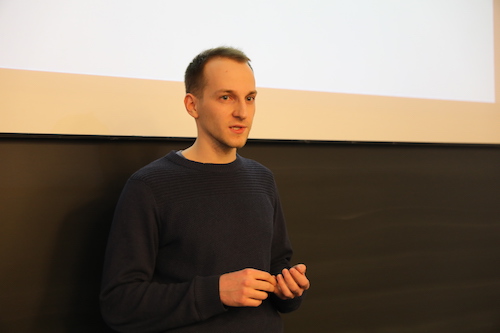 Misha Slabodkin
Misha Slabodkin
It was a great pleasure to solve theoretical problems, discuss with fellow students and tell them to teachers and other students on all subjects. Especially liked the practice in the "circle" format with the oral delivery of tasks - I have always considered this as the most effective method of teaching.
Many holidays of the end of the semester are vividly remembered, especially karting and paintball, which I helped to organize a little. Participation in such entertainments together with teachers was extremely useful for “humanizing” the CS center in the eyes of students.
Cyril Broadt
I lived the first semester with algorithms, woke up, ate and fell asleep with them. It was such that I woke up in three nights from what came up with a solution. Well, or at least there was an illusion of what he came up with. I got up, turned on the laptop, coded it, poured it into the test system and everything fell on the conditional 20 test. I suffered until 5 in the morning, without solving the problem, and fell asleep. But then I still finished it :)
Leila Khatbulina
In the CS center I found a lot of new friends. I remember discussing homework in the night chats, waiting for their turn for the exam until late at night, at the same time explaining tickets to each other, celebrating birthdays in the kitchen at the Times Center, playing games at the end and semester holidays. It was fun! :)
Why did you start teaching? Have you been invited or have you decided to start?
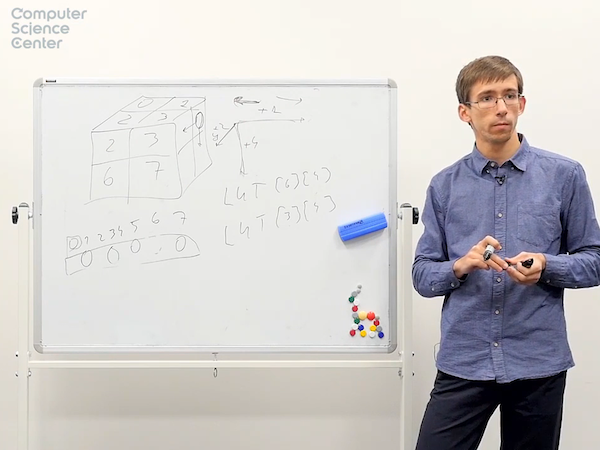 Kolya Polar
Kolya Polar
At some point I came to the area of three-dimensional reconstruction, that is, image processing. At the same time, I plunged into calculations on video cards, since it is impossible to process such data scales on a processor in a reasonable time. And there was a stable feeling of sadness that I was never told about these areas, despite their interestingness. In addition, I always liked to teach, and I knew where I could go to offer a course, so I decided to correct the situation and make my own - for a start on video cards.
Misha Slabodkin
In 2016, Sasha Knoop conducted a practice in discrete mathematics. Before the start of the semester, he decided that checking 70 homework per week was higher than his moral strength and offered to help me. And a year later we changed: from that moment I conduct classes, and Sasha helps with the check.
Cyril Broadt
During the training there were rumors that there is an opportunity to teach. And I thought that would be great. I like to help others in what I can. I do not like to ask for it and waited for me to be invited :)
Leila Khatbulina
I always liked to teach: at school, I voluntarily explained the fractions on tangerines after school, and at the university I worked with a German girl, and as a result she passed on A1 in six months. I was invited to the CS Center, as there was a vacant place, and I casually said that I would gladly take it :)
Lyosha Artamonov
I got into image analysis while studying at the center. The circumstances were such that Natalia, who taught me the course, moved to the USA. Then the curators offered to take the course for me and Grisha Rozhkov. Grisha was at that time a student of the CS Center - he graduated in spring 2015.
What were the fears before starting work as a teacher?
Kolya Polar
I have seen many good lecturers and have always been rather critical of poorly organized lectures, and now I am on the other side of the barricades. "I am from the past" in preparing and reading the course was the most terrible critic. Fears were natural: poor presentation, too boring material and excessive detail at a low feed rate, too complex or uninteresting details at a too high pace, wasted listeners time and so on.
Misha Slabodkin
I will answer specifically about teaching in the CS center, because there were an infinite number of teaching anxieties with different courses in different years :)
- It is quite difficult to conduct the practice for an audience of 50 people. In fact, this is a lecture about puzzles, not personal communication with each student, as I sometimes do in other subjects.
- The level of training and preliminary knowledge of the subject varies greatly among students, therefore, it is necessary to select the appropriate various tasks and disassemble them so as to interest everyone.
Leila Khatbulina
There was uncertainty in their knowledge, she was afraid that when checking homework students would not agree with my assessment. But all the fears were in vain :)
Remember how you spent your first lesson?
Kolya Polar
At the very first lecture there were many listeners, and there were not enough chairs in the audience. I told the material faster than I expected, and as a result I continued to speak without slides. But I assumed that this could happen, so I had the material and everything went well.
Misha Slabodkin
I was glad that there are people in the audience and I will have someone to laugh at my failures!
Cyril Broadt
There was a feeling that I had cancer of speech and nobody understood what I said.
Lyosha Artamonov
I sat in front of the audience and mumbled something under his breath. In general, it was not so good, but then it became better :)
What do you like most about teaching?
Misha Slabodkin
Oh, I can answer that confidently and immediately: I definitely enjoy reading the reviews most of all! When the curators send them, I open the file with the feeling of unpacking gifts under the Christmas tree and read everything twice.
I also like to discuss interesting problems with students, to watch how they rejoice at beautiful ideas, new unexpected facts and connections with different areas of mathematics. See sincere curiosity and desire for knowledge. To tell the problems, the solution of which I recently enjoyed very much, and to observe the same impression from the audience. Discussing with students additional tasks after couples until the moment when the guards come to ask at 23:00 to ask if I have a sound mind (it was three times already!).
Cyril Broadt
I like to come up with different explanations of the same material, and, as a result, a deeper understanding appears.
Leila Khatbulina
As in a joke: “Bye explained - I already understood it myself”.
Lyosha Artamonov
I love it when the audience answers my questions correctly.
How did studying at the CS center influence your teaching?
Kolya Polar
I understand that course participants have a different amount of time that they can devote to the course. Therefore, on the one hand, at lectures I talk about complex algorithms from the real world (along with simple synthetic tasks like sorting), and on the other hand, I give only simple tasks in my homework, because they are suitable for fixing key concepts. This will not take unreasonably a lot of time and effort. In addition, I know that some of the students already have basic knowledge of the course, so they are not interested in listening to part of the lectures, and they will rather read the slides diagonally. Therefore, I am trying to make the slides self-sufficient with links to original articles to go deeper.
Misha Slabodkin
At the CS Center, teachers are open for communication and happy to help students. Remembering how kindly I communicated with me during my studies, I try to create the same impression among those who attend my course.
You teach in other places. Tell me where? What are the features of teaching in the CS center?
Kolya Polar
He taught in school math circle, now I teach programming in school. Someday I want to give a course on computer vision with an emphasis on three-dimensional reconstruction, but there is a lot of material there, so it’s unclear when I'm ready.
All conditions are created in the CS Center: minimum bureaucracy, convenient moments like video recordings that are organized in such a way that the lecturer does not waste time and energy on them. There are even supporting tools like feedback through a survey of students. And, of course, the lack of commitment of the course: if the student is not interested, he will not listen to the course. As a result, all students are well motivated.
Misha Slabodkin
In addition to the CS Center, I taught various mathematics in mathematics, in the circle of 239 lyceums, at the Academic University and in the magistracy ITMO-JetBrains. Sometimes I read “entertaining” mini-lectures to my colleagues or friends, if I find out something interesting near-mathematical. If there are no sudden moves, I plan to continue.
In the CS center there are excellent curators who turn all the formalities into simple and pleasant minute affairs and help the teachers to think only about the preparation of classes. The organization of holidays, board games and souvenir T-shirts is also very important - it helps to acquaint students with each other and with teachers and implicitly makes classes more pleasant.
The main feature is the teaching in rarely conducted exams: reporting depends only on the seminars, and lectures seem to students less important. Because of this, part of the material is quickly forgotten, which sometimes interferes with practical exercises.
And finally, advice to those who want to teach
Cyril Broadt
Do not forget to talk about obvious things for you to students for whom this may not be obvious. Perhaps after this you will realize that you yourself do not understand anything and will have to dig deeper.
Leila Khatbulina
Drop any doubts :) If you want to share knowledge with someone and it brings pleasure, then go for it, even if it is the course “How to weave baubles”. Your audience will always be there and will surely say “thank you”.
')
Source: https://habr.com/ru/post/446982/
All Articles